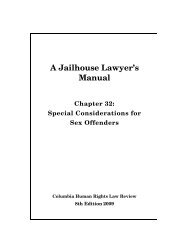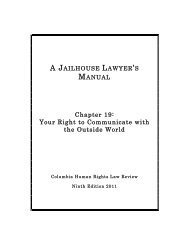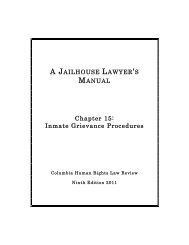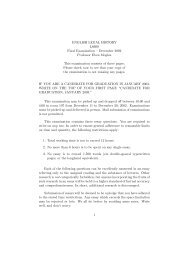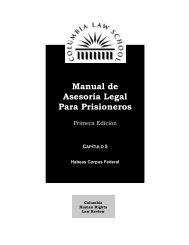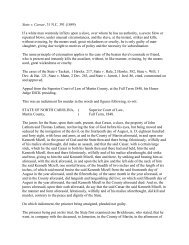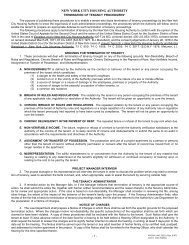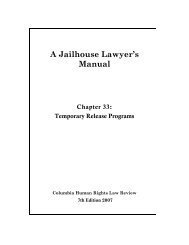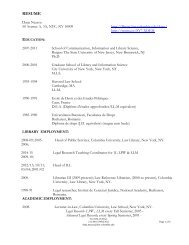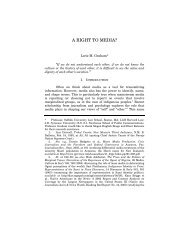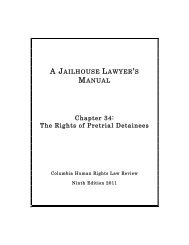The Right to Dignity Rex D. Glensy - Columbia Law School
The Right to Dignity Rex D. Glensy - Columbia Law School
The Right to Dignity Rex D. Glensy - Columbia Law School
You also want an ePaper? Increase the reach of your titles
YUMPU automatically turns print PDFs into web optimized ePapers that Google loves.
2011] <strong>The</strong> <strong>Right</strong> <strong>to</strong> <strong>Dignity</strong> 127<br />
problem that can act either through conscious application or else from<br />
a subconsciously au<strong>to</strong>programmed source. <strong>The</strong>refore, if the question<br />
asked is whether “dignity [is] an independent attribute of personhood,<br />
or . . . a part of personhood related <strong>to</strong>, derived from, and/or a part of<br />
au<strong>to</strong>nomy, liberty, equality,” 282 the answer which the proxy approach<br />
responds is “the latter.”<br />
<strong>The</strong> proxy approach feeds on the natural affinity between<br />
human dignity and other rights that are associated with valuing<br />
personhood and that, perhaps, are more familiar within American<br />
legal culture. This familiarity, in turn, should comfort ac<strong>to</strong>rs in the<br />
U.S. legal system because the solicitation of dignitary interests would<br />
always be subsumed within rights or causes of action that are deeply<br />
rooted within American tradition, such as equal protection and due<br />
process on the rights side, or defamation and trademark infringement<br />
on the rights of action side. Another motivation for the proxy<br />
approach is related <strong>to</strong> the general unease with the metamorphic<br />
character of dignity rights, which causes the proxy approach <strong>to</strong> take<br />
many different shapes in those occasions when it is deployed. Clearly,<br />
cultural inputs have <strong>to</strong> a large extent gone in<strong>to</strong> the attempt <strong>to</strong> better<br />
understand the concept of human dignity, which has inevitably led <strong>to</strong><br />
the significant divergence of opinion illustrated in Part II above.<br />
<strong>The</strong>refore, a solution that lends itself better <strong>to</strong> assimilation with<br />
currently existent American jurisprudence would seem ideal, if one<br />
accepts the premise of a jurisprudential role for the right <strong>to</strong> dignity in<br />
some form. In this light, the heuristically sensitive approach <strong>to</strong> the<br />
right <strong>to</strong> dignity might better comport with the traditional<br />
understanding of rights as theorized since the very beginning of<br />
American legal thought. For example, Thomas Hobbes and John<br />
Locke envisioned society as being comprised of au<strong>to</strong>nomous<br />
individuals left free <strong>to</strong> lead their lives <strong>to</strong> the best of their abilities. 283<br />
It then follows that “[w]hat citizens modeled on this image need <strong>to</strong> be<br />
282. Resnik & Suk, supra note 68, at 1929; see also McAllister, supra note<br />
209, at 503 (“[c]ertainly, notions of equality and liberty are intimately linked <strong>to</strong><br />
human dignity”).<br />
283. See Thomas Hobbes, Leviathan 74 (Edwin Curley ed., Hackett<br />
Publishing 1994) (1651); John Locke, Second Treatise of Government 8, §4 (C.B.<br />
Macpherson ed., Hackett Publishing 1980) (1690); see also Gunner Myrdal, An<br />
American Dilemma, <strong>The</strong> Negro Problem and Modern Democracy 4 (2d ed. 1944)<br />
(“<strong>The</strong>se ideals of the essential dignity of the individual human being, of the<br />
fundamental equality of all men, and of certain inalienable rights <strong>to</strong> freedom,<br />
justice, and a fair opportunity represent <strong>to</strong> the American people the essential<br />
meaning of the nation’s early struggle for independence.”).



